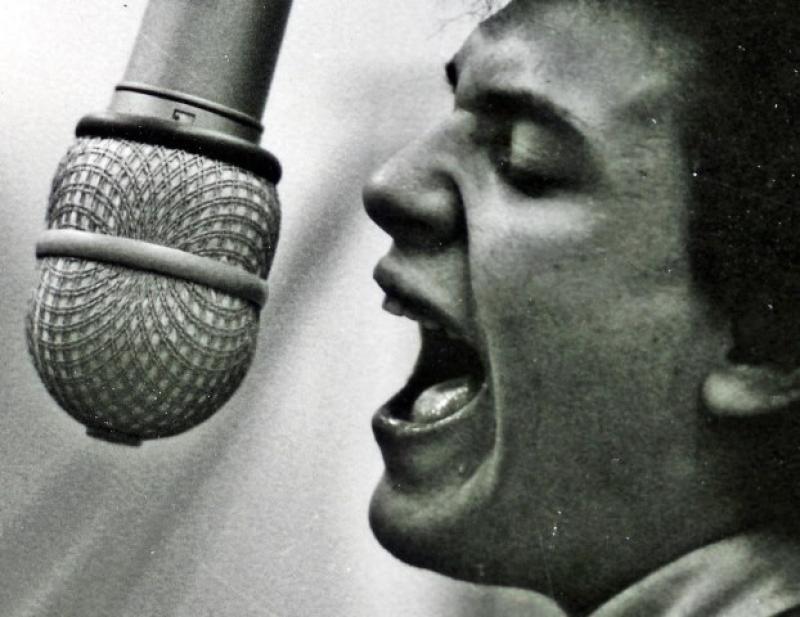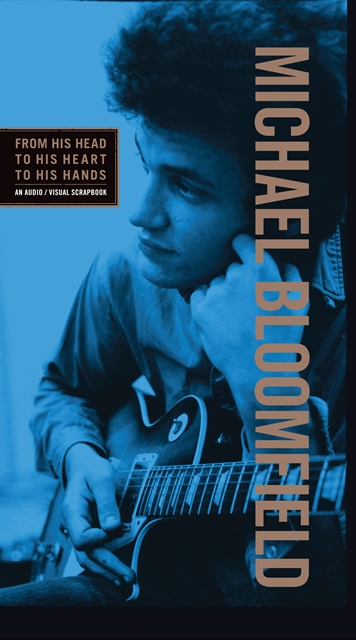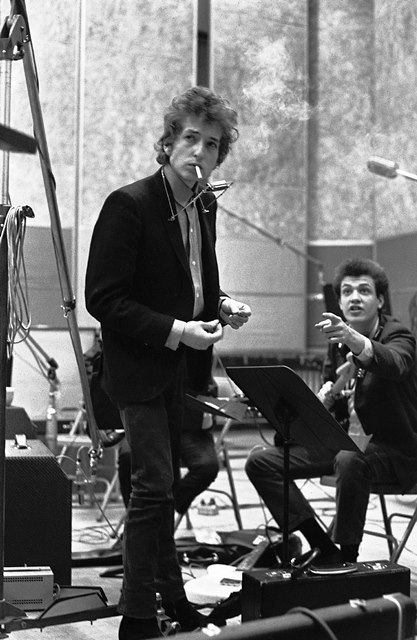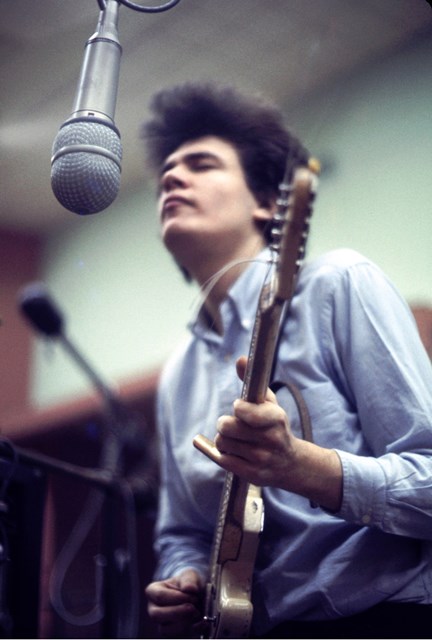Reissue CDs Weekly: Mike Bloomfield | reviews, news & interviews
Reissue CDs Weekly: Mike Bloomfield
Reissue CDs Weekly: Mike Bloomfield
Box set pays selective tribute to great American guitarist

 Michael Bloomfield: From his Head to his Heart to his Hands
Michael Bloomfield: From his Head to his Heart to his Hands
Mike Bloomfield was undoubtedly one of rock’s greatest and most distinctive guitarists. He was also wildly erratic and did much to undermine what others saw in him. He died at age 37 in 1981. He had been a drug addict and self-mythologist. The records he left behind were many, and he never landed in one band or place for long. Crucial to Bob Dylan turning his back on the acoustic, he was on stage with him when he went electric at Newport in 1965. His stinging tones helped define “Like a Rolling Stone”. Dylan told Bloomfield not to play any of that “B B King shit.” Whatever Dylan thought or wanted, Bloomfield was wedded to the blues.
From his Head to his Heart to his Hands is a four-disc set dedicated to Bloomfield’s messy legacy. It is compiled by friend and fellow traveller with Dylan, Al Kooper. To Bloomfield, Kooper was Alan. To Kooper, Bloomfield was Michael. Hence the title credit for the man universally known as Mike. Three of the discs are music, the fourth is a DVD. An increasing rarity these days, it’s a straightforward book-bound set. The book included is equally straightforward and unfussily tells the story and pays tribute. The main draws are an instrumental version of “Like a Rolling Stone” with the vocal scrubbed out and a previously unheard early take of Dylan’s “Tombstone Blues”.
Born in 1943, Bloomfield grew up in Chicago. His family were Jewish, wealthy and ran a company making restaurant supplies. The household had black employees. The maid of another family took Bloomfield, at 15, to see Art Blakey, Sonny Stitt and Miles Davis. The teenager was already playing guitar and smitten with rock‘n’roll. He was soon returning to clubs on his own, and joined whichever blues musicians would allow him to share their stage.
 After two auditions for Columbia Records in 1964, he joined the multiracial Butterfield Blues Band, then formed The Electric Flag. He abandoned them in 1968, and after the Super Session album with Kooper and a 1969 solo set, his path became erratic and tough to disentangle (pictured left, Mike Bloomfield tells Bob Dylan how it is, Columbia Recording Studios, New York, 1965).
After two auditions for Columbia Records in 1964, he joined the multiracial Butterfield Blues Band, then formed The Electric Flag. He abandoned them in 1968, and after the Super Session album with Kooper and a 1969 solo set, his path became erratic and tough to disentangle (pictured left, Mike Bloomfield tells Bob Dylan how it is, Columbia Recording Studios, New York, 1965).
This box set solves that problem by dedicating disc one to the early years, where the winning but uncommercial early 1964 Columbia audition - his initial try-out for the label - is heard for the first time. He was not signed. The second disc encompasses jams, Super Session material and live outings – all with Kooper. The more random third is mostly live material from 1969, 1977 and 1978. Also included is Bloomfield’s previously unreleased final live union with Dylan from 1980, an OK, chugging version of “The Groom’s Still Waiting at the Altar”. The DVD is of the engaging documentary Sweet Blues: A Film about Michael Bloomfield. It exudes poignancy. The box set concludes with Kooper's own (unlisted in the package) "They Just Don't Make 'em Like That Anymore". Athough no doubt sincere, it is plain awful.
Kooper’s vision of Bloomfield draws from the parallels he sees between himself and the guitarist, but too many aimless jams and by-rote blues workouts are included. The liner notes say “there were numerous solo albums released throughout the ‘70s and ‘80s.” Tracks from none are included. Surely there was something worthwhile on them which could have filled out the picture? Equally, hardly any of Bloomfield’s huge body of session work is included.
 The frustrations with this box are highlighted by its obvious foregrounding of Bloomfield. The Butterfield Blues Band album track “East-West” from 1966 is one of the most amazing, important and questing pieces of rock, fusing jazz, Indian music and blues. Without it, there would have been no Quicksilver Messenger Service. It was a direct influence on the early Dream Syndicate, reviewed last week. But that track was not all Bloomfield. The original album credits, not included here, read “order of solos: Elvin Bishop, Paul Butterfield, Mike Bloomfield.” The band was more than a vehicle or showcase for Bloomfield (pictured right, Mike Bloomfield tries out for Columbia Records a second time: Columbia Recording Studio, Chicago, 7 December 1964).
The frustrations with this box are highlighted by its obvious foregrounding of Bloomfield. The Butterfield Blues Band album track “East-West” from 1966 is one of the most amazing, important and questing pieces of rock, fusing jazz, Indian music and blues. Without it, there would have been no Quicksilver Messenger Service. It was a direct influence on the early Dream Syndicate, reviewed last week. But that track was not all Bloomfield. The original album credits, not included here, read “order of solos: Elvin Bishop, Paul Butterfield, Mike Bloomfield.” The band was more than a vehicle or showcase for Bloomfield (pictured right, Mike Bloomfield tries out for Columbia Records a second time: Columbia Recording Studio, Chicago, 7 December 1964).
More curiously, The Electric Flag’s A Long Time Comin’ from 1968 is noted as “their first album.” It was not. Their debut was the 1967 album of their music written for the film The Trip (the album included music not used in the film: all but one of the tracks were written by Bloomfield). Some of the stellar, atmospheric cuts from The Trip would have made fine inclusions here. Listen to The Trip’s “Fine Jung Thing” on the next page.
From his Head to his Heart to his Hands is a heartfelt tribute to a great. But by choosing not to cast its net wide, it is a missed opportunity.
Overleaf: listen to The Electric Flag’s “Fine Jung Thing”, from The Trip soundtrack album
Listen to The Electric Flag’s “Fine Jung Thing”, from The Trip soundtrack album
Share this article
The future of Arts Journalism
You can stop theartsdesk.com closing!
We urgently need financing to survive. Our fundraising drive has thus far raised £49,000 but we need to reach £100,000 or we will be forced to close. Please contribute here: https://gofund.me/c3f6033d
And if you can forward this information to anyone who might assist, we’d be grateful.

Subscribe to theartsdesk.com
Thank you for continuing to read our work on theartsdesk.com. For unlimited access to every article in its entirety, including our archive of more than 15,000 pieces, we're asking for £5 per month or £40 per year. We feel it's a very good deal, and hope you do too.
To take a subscription now simply click here.
And if you're looking for that extra gift for a friend or family member, why not treat them to a theartsdesk.com gift subscription?
more New music
 Album: Dinosaur Pile-Up - I've Felt Better
Heavy rock power pop trio return after an unwanted lengthy break
Album: Dinosaur Pile-Up - I've Felt Better
Heavy rock power pop trio return after an unwanted lengthy break
 Album: Tom Grennan - Everywhere I Went Led Me To Where I Didn't Want To Be
British pop star's fourth exhibits ultra-pop oomph with mixed results
Album: Tom Grennan - Everywhere I Went Led Me To Where I Didn't Want To Be
British pop star's fourth exhibits ultra-pop oomph with mixed results
 Album: Emma Smith - Bitter Orange
The award-winning jazz singer brings new life to some classic standards
Album: Emma Smith - Bitter Orange
The award-winning jazz singer brings new life to some classic standards
 BBC Proms: Anoushka Shankar 'Chapters' review - somehow, it worked
Shankar's starry presence brings focus to this orchestral version
BBC Proms: Anoushka Shankar 'Chapters' review - somehow, it worked
Shankar's starry presence brings focus to this orchestral version
 Album: Marissa Nadler - New Radiations
The Nashville-based singer-songwriter explores disconnection
Album: Marissa Nadler - New Radiations
The Nashville-based singer-songwriter explores disconnection
 Album: Rise Against - Ricochet
Have the US punk veterans finally run out of road?
Album: Rise Against - Ricochet
Have the US punk veterans finally run out of road?
 Music Reissues Weekly: The Final Solution - Just Like Gold
Despite their idiotic name, these San Francisco psychedelic pioneers sounded astonishing
Music Reissues Weekly: The Final Solution - Just Like Gold
Despite their idiotic name, these San Francisco psychedelic pioneers sounded astonishing
 Mogwai / Lankum, South Facing Festival review - rich atmospheres in a south London field
Two polished performances and an embarrassment of instruments
Mogwai / Lankum, South Facing Festival review - rich atmospheres in a south London field
Two polished performances and an embarrassment of instruments
 Album: Alison Goldfrapp - Flux
The synth diva in her comfort zone - maybe getting a little too comfortable, though
Album: Alison Goldfrapp - Flux
The synth diva in her comfort zone - maybe getting a little too comfortable, though
 Album: The Black Keys - No Rain, No Flowers
Ohio rockers' 13th album improves on recent material, but still below mainstream peak
Album: The Black Keys - No Rain, No Flowers
Ohio rockers' 13th album improves on recent material, but still below mainstream peak
 Wilderness Festival 2025 review - seriously delirious escapism
A curated collision of highbrow hedonism, surreal silliness and soulful connection
Wilderness Festival 2025 review - seriously delirious escapism
A curated collision of highbrow hedonism, surreal silliness and soulful connection
 Album: Ethel Cain - Willoughby Tucker, I'll Always Love You
Relatively straightforward songs from the Southern Gothic star - with the emphasis on 'relatively'
Album: Ethel Cain - Willoughby Tucker, I'll Always Love You
Relatively straightforward songs from the Southern Gothic star - with the emphasis on 'relatively'

Add comment